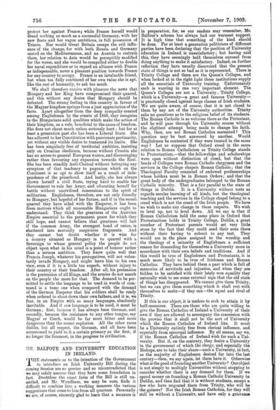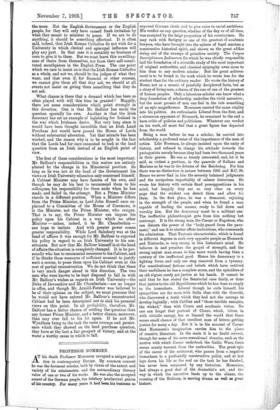MR. BALFOIT AND UNIVERSITY EDUCATION IN IRELAND.
THE statements as to the intention of the Government to introduce an Irish University Bill during the coming Session are so precise and so uncontradicted that we may safely assume that they have some foundation in fact. Doubtless the exact form of the Bill is still un- settled, and Mr. Wyndham, we may be sure, finds it difficult to combine into a working measure the various suggestions that come to him from all quarters. Personally we are, of course, sincerely glad to learn that a measure is in preparation, for, as our readers may remember, Mr. Balfour's scheme has always had our warmest support. It is high time that something of the kind should be done. For at least a generation politicians of different parties have been declaring that the position of University education in Ireland is unsatisfactory; but having said this, they have seemingly held themselves excused from doing anything to make it satisfactory. Indeed, on further reflection they have usually discovered that the present state of things is not so bad as it is represented. There is Trinity College and there are the Queen's Colleges, and when looked at in the right light these institutions supply all the essentials of University training. Unfortunately each is wanting in one very important element. The Queen's Colleges are not a University ; Trinity College, which is a University—a ,great and famous 'University— is practically closed against large classes of Irish students. We are quite aware, of course, that it is not closed to them by any act of the University authorities. Trinity asks no questions as to the religious belief of its students. The Roman Catholic is as welcome there as the Protestant, and he will pass through his University course without the slightest attempt being made to change his faith. Why, then, are not Roman Catholics contented ? This question may be best answered by another. Would Englishmen be contented if they were treated in the same way ? Let us suppose that Oxford stood in the same relation to Roman Catholicism as Trinity College stands to Protestantism,—that the fellowships and scholarships were open without distinction of creed, but that the beads of Colleges were Roman Catholic clergymen and the services in the College chapels Roman Catholic ; that the Theological Faculty consisted of endowed professorships whose holders must be in Roman Orders ; and that the great body of the undergraduates belonged to the Roman Catholic minority. That is a fair parallel to the state of things in Dublin. It is a University without tests as regards secular learning of all kinds, but the theological teaching and the services in the College chapel belong to a creed which is not the creed of the Irish people. We have no wish to make any change in these respects. We wish to level up, not to level down. All we say is that if Roman Catholicism held the same place in Oxford that Protestantism holds in Trinity College, Dublin, a great number of Protestant parents would set very little store by the fact that they could send their sons there without their having to submit to any test. They would see in the place assigned to the worship and the theology of a minority of Englishmen a sufficient reason for demanding for themselves a University more in accordance with their own beliefs and traditions. And if this would be true of Englishmen and Protestants, it is much more likely to be true of Irishmen and Roman Catholics. They have behind them a past which is full of memories of servitude and injustice, and when they are bidden to be satisfied with their lately won equality they naturally wish to see some external sign that the old state of things has disappeared. We cannot give them Trinity, but we can give them something which it shall rest with themselves to make—if they can—the equal and rival of Trinity.
If this is our object, it is useless to seek to attain it by. half-measures. There are those who are quite willing to give the Roman Catholics of Ireland a University of their own if they are allowed to accompany the concession with the proviso that it shall not be the sort of University which the Roman Catholics of Ireland like. It must be a University entirely free from clerical influence, and especially from episcopal influence. By all means, say we, if the Roman Catholics of Ireland wish for such a Uni- versity. But if, on the contrary, they desire a University in the government of which the clergy, and especially the Bishops, are to take their share—such a University, in fact, as the majority of Englishmen desired far into the last century—then, we say again, let them have it. Otherwise what is the good of founding another University? Ourobject is not simply to multiply Universities without stopping to consider whether there is any demand for them. If we spend money on founding a Roman Catholic University in Dublin, and then find that it is without students, except a few who have migrated there from Trinity, who will be the gainers? Not the Irish Roman Catholics, for they will still be without a University, and have only a grievance themore. Not the English Government or the English people, for they will only have caused fresh irritation by what they meant to minister to peace. If we are to do anything, it should be something effectual. It is often said, indeed, that Irish Roman Catholics do not wish for a University in which clerical and episcopal influence will play any part. In that case it is certainly no business of ours to give it to them. But we must learn this unwilling- ness of theirs from themselves, not from their self-consti- tuted. mouthpieces in the English Press. The one point which we care to insist on is that the Irish Roman Catholics as a whole, and not we, should be the judges of what they want, and that even if, for financial or other reasons, we cannot give them all that they ask, we should at all events not insist on giving them something that they do not ask.
What chance is there that a demand which has been so often• played with will this time be granted ? Happily, there are some considerations which point strongly in this direction. One is that Mr. Balfour has made the question specially his own. Another is that the Irish Secretary has set an example of legislating for Ireland in the way which Irishmen desire. Not very long since it would have been thought incredible that an Irish Land Purchase Act would. have passed the House of Lords without substantial alteration. Yet that miracle has been worked, and the reason why is to be sought in the fact that the Lords had for once consented to look at the land question from an Irish instead of an English point of view.
The first of these considerations is the most important. Mr. Balfour's responsibilities in this matter are entirely altered by the change in his Ministerial position. So long as he was not at the head of the Government his views on Irish University education only concerned himself. A Cabinet Minister may have fancies of his own, and though he may do his best to recommend them to his colleagues, his responsibility for them ends when he has made, and failed in, the attempt. But a Prime Minister stands in a different position. When a Minister differs from the Prime Minister, as Lord John Russell once ex- plained to a Committee of the House of Commons, it is the Minister, not the Prime Minister, who resigns. That is to say, the Prime Minister can impose his policy upon his Cabinet in a way which no other Minister -- unless, indeed, it be Mr. Chamberlain — can hope to imitate. And with greater power comes greater responsibility. While Lord Salisbury was at the head of affairs it was enough for Mr. Balfour to expound his policy in regard to an Irish University to his con- stituents. But now that Mr. Balfour himself is at the head of affairs the situation is completely changed. It is be per- sonally who has to recommend measures to his Cabinet, and if he ihinks those measures of sufficient moment to justify such a course, to press them upon his Cabinet even at the cost of partial reconstruction. We do not think that there is-very much danger ahead in this direction. The two men who were known to be least disposed to fall in with Mr. Balfour's wishes as regards an Irish University—the Duke of Devonshire and Mr. Chamberlain—are no longer in office, and though Mr. Arnold-Forster was believed. to be of their opinion on the subject, we must presume that he would not have entered Mr. Balfour's reconstructed Cabinet had he been determined not to sink his personal views on this point. In all probability, therefore, Mr. Balfour has a better chance of settling the question than any former Prime Minister, and a better chance, moreover, than may ever fall to his lot again. If he and Mr. Wyndham bring to the task the same courage and persist- ence which they showed on the land. purchase question, they have at the best a fair prospect of victory, and at the worst a worthy cause in which to fall.































































 Previous page
Previous page